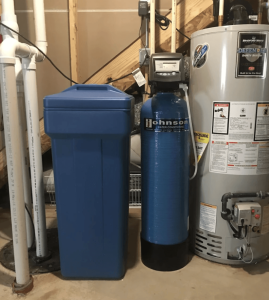Eliminating Pipe Buildup with a Water Softener: Insights from a Pentair Water Softening Company in Cortland, Illinois

Water softeners provide a range of different benefits — one of which is that they eliminate mineral buildup within a home’s water pipes.
Are you interested in learning how they do this? Wondering why mineral buildup is a problem to begin with? If so, you’ve come to the right place. This Pentair water softening company in Cortland, Illinois is going to explain below.
How Does Hard Water Result in Pipe Buildup?
Let’s begin by discussing the role of hard water in pipe buildup. Hard water contains excess amounts of calcium and magnesium. Over time, as hard water passes through water pipes, it leaves calcium and magnesium on the pipes’ interior walls.
At first, this has very little effect on the functionality of the pipe. But as more time passes, calcium and magnesium accumulate. This eventually results in the pipe narrowing, which reduces water pressure through the pipe.
In some cases, the problem can grow so severe that the pipe closes off entirely. When this occurs, water flow ceases, and the pipe is no longer functional. These situations require a full pipe replacement, which can cost thousands of dollars.
By having a water softener installed by your local Pentair water softening company in Cortland, Illinois, you can avoid this problem entirely. A water softener will remove calcium and magnesium from your water supply, thereby ensuring that they don’t stick to the interior walls of your water pipes.
How Does a Water Softener Remove Calcium and Magnesium Particles?
We’ve gone into detail about how hard water slowly takes a toll on water pipes. We’ve highlighted the importance of the water softener in preserving your home’s pipes. Now, let’s talk a little about how the water softener removes calcium and magnesium particles from a water supply.
The water softener utilizes a scientific principle known as ‘ion exchange’. This is when positively charged ions swap places with negatively charged ions. As far as the water softener goes, sodium ions swap places with calcium and magnesium ions.
The water softener facilitates this using a collection of resin beads. These are contained within the water softener’s water tank. Whenever hard water comes rushing through the tank, the sodium ions leave the beads and are swapped out with the calcium and magnesium from the hard water.
By the time the water has left the water softener, it’s entirely void of all calcium and magnesium particles. Yes, it still contains some sodium particles. However, the amount is so low that it has no discernible effect on the water’s quality. The water maintains its taste and general consistency, without the presence of calcium and magnesium particles.
With the calcium and magnesium particles being removed, the water will have very little effect on the interior walls of your water pipes. Some residual minerals may cause light buildup over the years, but it’s nothing in comparison to what the calcium and magnesium in hard water will cause.
There’s only one thing you need to do to keep your water softener operating in this manner: fill it up with softener salt every one to two months, or as recommended by your Pentair water softening company in Cortland, Illinois. Assuming you do this, you won’t have to worry about internal pipe buildup becoming an issue.
Looking for a Pentair Water Softening Company in Cortland, Illinois?
Are you ready to eliminate the risk of internal pipe buildup? If so, and you’re ready to have a new system installed by the best Pentair water softening company in Cortland, Illinois, Johnson Water Conditioning has you covered.
Contact us today to get started.

 Better Water for
a Better Life
Better Water for
a Better Life
